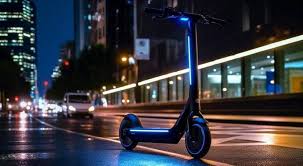The Rise of Electric Scooters: A Green Revolution on Wheels
In recent years, electric scooters have surged in popularity, reparatie fatbike transforming urban transportation and making significant strides towards sustainable commuting. These agile, battery-powered vehicles have captured the attention of city dwellers and eco-conscious travelers alike. With their blend of convenience, efficiency, and environmental friendliness, electric scooters are redefining how we think about urban mobility.
A Brief History
Electric scooters are not a new concept. The first electric scooter was introduced in the late 19th century, but it wasn’t until the early 21st century that they began to gain traction. The boom in electric scooter popularity can be traced back to several factors: the rising awareness of climate change, advancements in battery technology, and the need for efficient urban transportation solutions. The introduction of shared electric scooter services in cities across the globe further propelled their appeal, making them accessible to a broader audience.
Environmental Benefits
One of the most compelling reasons to embrace electric scooters is their environmental impact. Traditional modes of transport, such as cars and buses, contribute significantly to air pollution and greenhouse gas emissions. Electric scooters, on the other hand, produce zero tailpipe emissions, offering a cleaner alternative for short trips. A study conducted by the International Council on Clean Transportation revealed that electric scooters could reduce greenhouse gas emissions by up to 70% compared to conventional vehicles.
Moreover, electric scooters have a lower carbon footprint when considering their entire lifecycle. Their production requires fewer resources, and with advancements in renewable energy, charging these scooters can be powered by clean energy sources, further reducing their environmental impact.
Convenience and Accessibility
Electric scooters are not only eco-friendly but also incredibly convenient. They provide an efficient solution for short-distance travel, often allowing riders to bypass traffic and avoid the hassle of parking. Many urban areas are adopting dedicated scooter lanes, further enhancing safety and accessibility.
Additionally, electric scooters are often available through app-based rental services, making them an attractive option for those who may not want to invest in their own vehicle. With just a few taps on a smartphone, users can locate, unlock, and ride a scooter, making it an ideal choice for commuters and tourists alike.
Health and Economic Benefits
Beyond their environmental advantages, electric scooters contribute to public health and economic growth. By encouraging people to opt for scooters over cars, cities can alleviate congestion and reduce the strain on public transportation systems. This shift can lead to improved air quality and a reduction in traffic-related accidents.
Economically, the rise of electric scooters has created new job opportunities in the tech and transportation sectors. From scooter maintenance to app development and customer service, the electric scooter industry is generating jobs and fostering innovation.
Challenges Ahead
Despite their many benefits, electric scooters face several challenges. Concerns about safety, improper parking, and potential accidents have led to calls for better regulations and infrastructure. Cities must find a balance between encouraging scooter usage and ensuring public safety.
Moreover, battery disposal and recycling present environmental challenges. While electric scooters are a greener option than traditional vehicles, the production and disposal of lithium-ion batteries can have adverse effects on the environment if not managed properly.
The Future of Urban Mobility
The future of urban transportation is likely to involve a blend of various modes of transport, with electric scooters playing a crucial role. As technology continues to evolve, we may see further innovations, such as improved battery life, increased range, and more robust safety features.
Incorporating electric scooters into comprehensive urban mobility plans could lead to more sustainable and efficient cities. By promoting multimodal transportation that includes biking, public transit, and walking, urban planners can create integrated systems that reduce reliance on cars and enhance overall quality of life.
Conclusion
Electric scooters represent more than just a trend; they embody a shift towards sustainable urban mobility. With their potential to reduce emissions, alleviate traffic congestion, and enhance urban life, electric scooters are paving the way for a greener, more accessible future. As cities embrace this revolution on wheels, we can expect to see electric scooters become a familiar sight in our urban landscapes, helping us navigate our cities with ease and efficiency.

